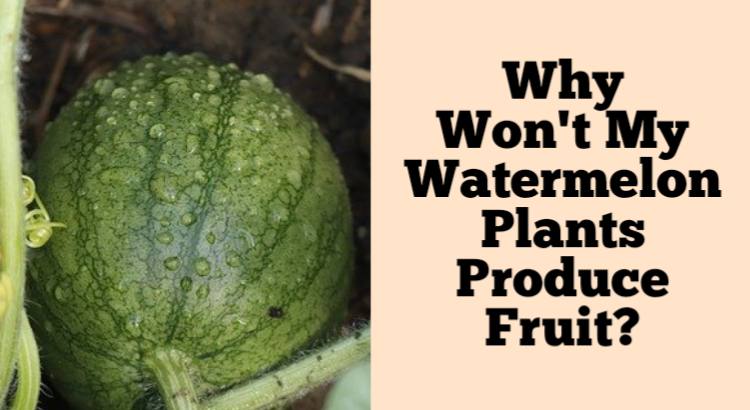You planted a watermelon plant, and now it’s growing and producing leaves. But you’re waiting for the fruit to form, and it’s not happening. Why won’t my watermelon plants produce fruit? There are several possible explanations for this situation, including:
Plants are not getting enough water.
Watermelon plants need a lot of water to grow properly. In fact, they should be kept moist at all times, but not wet. If the soil becomes too wet, it can cause the roots to rot and kill the plant.
To ensure you are watering your plants appropriately, check your soil daily and water in the morning or evening when temperatures are cooler so that you avoid sunburn on young leaves.
Not enough sun.
While watermelons are not fussy about their soil, they do need plenty of sun. In fact, your plants won’t produce fruit without at least 6 hours of direct sunlight every day.
If you’re growing your watermelons in a shady spot or under the shade provided by nearby trees, you may have to move them into an area with more light—or else they just won’t grow at all.
Soil is not right.
While it’s rare for watermelons to not produce fruit, if your plants are not producing any fruit and haven’t been pollinated by bees or other insects, the problem could be a soil issue.
Watermelon plants need well-drained soil that has been enriched with nutrients; too much water can cause root rot while too little will make the plants weak and unable to produce fruit.
To remedy this situation:
- Make sure your soil drains well so that it doesn’t get soggy from rain or melting snow
- Add compost or manure to the top inch of your soil before planting to add nutrients
- Use mulch around each plant so that weeds don’t compete for resources with the plant
Not enough nutrients in soil.
If your soil isn’t rich enough in nutrients, it can be difficult for the plants to grow. To improve the amount of nutrients in your soil:
Add organic matter. This includes compost, manure, or other sources of plant-based materials. You’ll need to add enough organic matter so that you have one inch (2.5 cm) of material covering your garden bed before planting.
Incorporate a balanced fertilizer into the soil as soon as possible after planting if you’re growing watermelons outdoors using an organic method.
If you’re going against the grain and using synthetic fertilizers instead, make sure they are high quality and follow package instructions carefully so that they don’t damage your plants.
Plants are too close together.
Planting your watermelons too close together will result in them not having enough space for roots to grow. This can lead to the plants being stunted or unable to produce fruit.
Watermelons need sunlight in order to grow and thrive, so you should make sure they are planted in an area that receives at least six hours of sun per day.
If you plant them too close together, they may not receive enough sunlight needed for growth and development.
If your watermelon plants are too close together and crowded out by other plants (including weeds), this will lead to a lack of air circulation around the plant leaves which could result in diseases such as powdery mildew getting worse if left unchecked for too long without treatment from yourself or another person who knows how.
There are many reasons why a plant might have trouble producing fruit.
Too much water—especially in the seedling stage, plants need to be kept evenly moist and not too wet. If your soil stays soggy for too long, it can kill young roots or stunt growth.
Once the plant is established, you can stop watering as often and allow the soil to dry out some between waterings.
Not enough water—if your plants aren’t getting enough moisture from rainfall or supplemental watering (which should be done during dry spells), they may not be able to properly absorb nutrients like iron and calcium that are essential for healthy growth of fruit-bearing stalks.
Soil is not right—your watermelon patch will grow best if you add compost or manure at least once per year; this helps break down organic matter in topsoil into usable nutrients by encouraging microorganisms like fungi, bacteria and worms that process dead organic matter into other forms of life needed by plants such as nitrogen gas (which fertilizes them). You can also grow your own compost at home.
Conclusion
While there are many reasons why watermelon plants are not producing fruit, the most common ones are not enough sun and soil that doesn’t contain enough nutrients. If your plants are not growing well from lack of water or nutrients then it probably won’t matter if they get enough sun because they will still die anyway.


